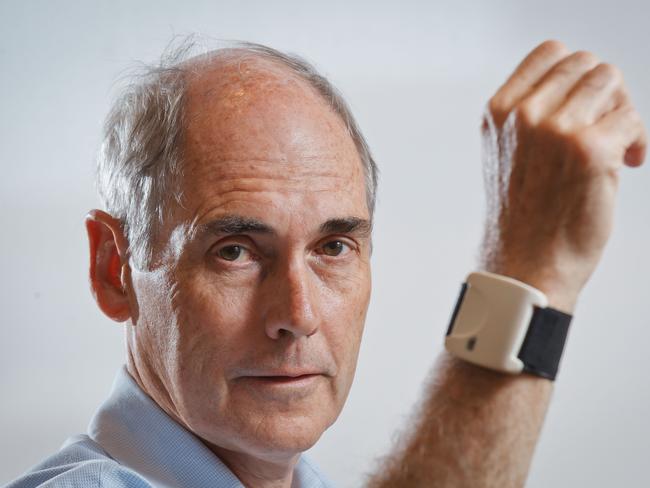’Fitbit’ device can help track Parkinson’s patients’ symptoms
A SMARTWATCH that tracks Parkinson’s disease patients’ movements like a Fitbit could dramatically improve the quality of life for people with the condition.
VIC News
Don't miss out on the headlines from VIC News. Followed categories will be added to My News.
A SMARTWATCH developed in Melbourne that tracks Parkinson’s disease patients’ movements like a Fitbit could dramatically improve the quality of life for people with the debilitating condition.
BRAIN IRON MAY PREDICT ALZHEIMER’S PROGRESSION
VITAMIN D LEVELS LINKED TO BETTER BRAIN HEALTH
NEIL DIAMOND RETIRES DUE TO PARKINSON’S
The movement monitor has been trialled with Australian patients to determine the benefits of having an objective measure, rather than having to rely on the patients reporting on their own symptoms.

The watch is worn for up to six days and records information while the patient is awake and asleep.
Doctors can use the data to track and tweak a patient’s therapy with the aim of reducing symptoms and improving their quality of life.
The Florey Institute of Neuroscience and Mental Health’s Professor Malcolm Horne, who is also a co-founder of the medtech company making the device, said it had an accelerometer that tracked symptoms of the disease, including tremors and slow or involuntary movements.
The information it gathers is fed into algorithms that produce symptom scores, so doctors can assess the timing and dosage of the patient’s medication.
One of the challenges for the more than 80,000 people with Parkinson’s disease is that, as the condition progresses, it becomes harder to treat with medications. Some only last a few hours before the effects wear off.

The watch, called the Personal KinetiGraph (PKG), is not subsidised for use in Australia, but some patients have access to the device through clinical trials or private practices.
Results of a small trial of 103 Tasmanian patients, published in npj Parkinson’s disease, demonstrated a benefit to having an objective measurement.
Prof Horne, who was the senior author on the paper, said the watch was designed to be used in the same way blood tests helped doctors determine the severity of diabetes and the effectiveness of drug regimes.
“Up until the arrival of the PKG, the way we used to manage Parkinson’s disease was to take a history from the patient by asking them how they were going,” Prof Horne said.
“It’s a bit subjective and people’s condition fluctuates over the course of the day, so putting an objective measurement around the assessment of their disease makes it much accurate to track drug dosage.”
Contact Parkinson’s Victoria for info on 1800 644 189 or parkinsonsvic.org.au


